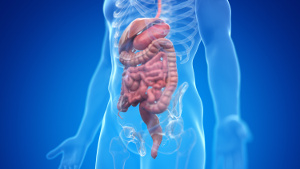Lack of vitamin B increases your risk of inflammatory bowel diseases
 Biotin, one of the B vitamins, is essential for numerous metabolic processes, and a biotin deficiency may be associated with inflammatory bowel disease (IBD). According to a new study that is published in Nutrients, a biotin deficiency can also have a negative impact on the intestinal flora and result in a suppression of symbiotic bacteria and a replication of harmful, dysbiotic bacteria. The scientists say that a disrupted gut flora caused by a biotin deficiency may contribute to inflammatory bowel disorders.
Biotin, one of the B vitamins, is essential for numerous metabolic processes, and a biotin deficiency may be associated with inflammatory bowel disease (IBD). According to a new study that is published in Nutrients, a biotin deficiency can also have a negative impact on the intestinal flora and result in a suppression of symbiotic bacteria and a replication of harmful, dysbiotic bacteria. The scientists say that a disrupted gut flora caused by a biotin deficiency may contribute to inflammatory bowel disorders.
The scientists behind the new study have shown in earlier research that biotin-deficient mice are likely to develop inflammatory bowel disease. This was tested and documented by feeding the mice a biotin-depleted diet or by blocking a biotin carrier that enables the uptake of biotin in the small intestine.
In their new study, the scientists wanted to study if the gut flora was also affected by such a biotin deficiency. In order to do this, they collected fecal samples and other samples from the bowels of the mice.
Both mice and humans have an essential intestinal flora that harbors many different species, and it is crucial for these species to keep each other in check in a delicate balance that is known as symbiosis. One of the tasks of a healthy, symbiotic gut flora is to displace harmful microorganisms, to improve the digestion, and to produce vitamins, enzymes, and signaling compounds. Some microorganisms in the gut flora are referred to as “opportunistic pathogens”, which means that they are harmless when they do not dominate and are not pathogenic unless they succeed in multiplying and spreading.
In the new study, the scientists observed that a biotin deficiency, whether it was induced by feeding the mice a biotin-depleted diet or by blocking the particular biotin carrier, resulted in the multiplication and spreading of opportunistic pathogenic microorganisms in a matter of 4-8 weeks. Among the pathogenic microorganisms were Klebsiella and Enterobacter that can cause urinary tract infection and Helicobacter that can cause stomach ulcers and duodenal ulcers.
In addition, several symbiotic bacteria, including Akkermansia, were inhibited. It is already known that many bacteria rely on a biotin supply to survive and thrive.
The scientists also noted that a biotin-depleted diet resulted in chronic inflammation within 8-12 weeks. This is the kind of inflammation that is seen in inflammatory bowel diseases. Moreover, the mice lost weight. It even turned out that the dysbiotic gut bacteria were able to synthesize biotin for their own need, which meant that they were not affected by the lack of biotin in the diet.
This effect was reinforced by the fact that symbiotic gut bacteria lacked biotin to support their own survival and growth, which was not the case with the dysbiotic bacteria. The scientists have shown a clear relation between biotin deficiency, intestinal dysbiosis, and the development of inflammatory bowel diseases.
- The most common inflammatory bowel diseases are Crohn’s disease and ulcerous colitis.
- The diet and lack of essential nutrients are of key importance
Biotin sources and deficiency causes
Biotin belongs to the water-soluble vitamins, which means we need them on a daily basis. We get biotin from liver and other types of offal, egg yolks, fish, whole grains, mushrooms, cabbage, nuts, seeds, and kernels.
The uptake and utilization of biotin is reduced by overcooking of food, a poor gut flora, alcohol abuse, antibiotics, and the use of epileptic medication.
Biotin (vitamin B7/B8) is important for our:
- Energy turnover
- Nervous system
- Blood sugar balance
- Skin and hair
- Mucosa
- Gut flora
References:
Julianne C. Yang. Biotin Deficiency Induces Intestinal Dysbiosis Associated with an Inflammatory Bowel Disease-like Phenotype. Nutrients 2023
Frida - Parametre (fooddata.dk)
Search for more information...
- Created on .
